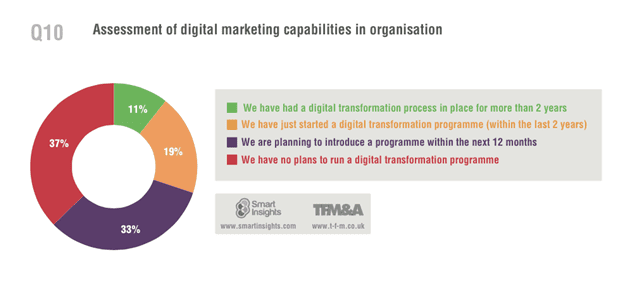An interview with Ann Holman discussing approaches for encouraging change
The Managing Digital Marketing 2015 research from Smart Insights showed that many businesses are planning a programme to manage digital transformation.

Around a third of businesses are planning a transformation programme, with another third of businesses already underway with their programme. So, what can companies who are about to embark on Digital Transformation learn from those who have already started?
 In my interview with Ann Holman, Strategic Digital Director helps answer this question, since she works with companies on their digital transformation. She set-up Our Think Lab to focus on R&D around digital and social media, providing consultancy on digital transformation. The interview discusses the importance the barriers and levers to change and suggests why larger organisations needs to act more like a start-up and views on the need for change in the education system. Let's start with the scope - what is Digital Transformation? She defines it as:
In my interview with Ann Holman, Strategic Digital Director helps answer this question, since she works with companies on their digital transformation. She set-up Our Think Lab to focus on R&D around digital and social media, providing consultancy on digital transformation. The interview discusses the importance the barriers and levers to change and suggests why larger organisations needs to act more like a start-up and views on the need for change in the education system. Let's start with the scope - what is Digital Transformation? She defines it as:
'using digital techniques to implement new business models, leverage operational improvements and enhance the customer experience.'
Q. Your background has seen you work in multiple different digital industries and sectors – what do you see as the biggest barriers to transforming an organisation to a digital future?
There are several that I have witnessed and experienced:
- 1. Lack of understanding and fear of change. Some brands see it as a threat rather an opportunity to increase revenue, reduce cost, improve brand loyalty and attract and retain the talent they need. The problems the ‘high street’ is facing at the moment is largely due to the fact that retailers are ignoring the fact that consumers simply want to do things online as well as offline. It’s not a threat but an opportunity. I believe if they had grasped this 10 years ago, they would not be suffering as they are at present.
- 2. Infrastructure isn’t set up for digital. This includes old IT systems, culture of the organisation, processes too rigid, managing the performance of the wrong things and not capturing data that brings insight. Plus most companies operate in silos still, our customers don’t. Therein, we have a problem.
- 3. Management skills. I think this across the board; it involves IT, HR and the ‘c’suite. What disappoints me so much is when I meet marketing professionals who really don’t get digital marketing or are still in the frame of mind of resisting the change because it doesn’t fit their ideal. It’s lazy and it’s tough – the customer is driving these changes, it's up to those of us involved in marketing to meet that need. Optimise and leverage employees – they know more than the c suite about social media and digital.
- 4. Not enough funding. I say this but it’s changing. The big corporate companies have realised in the last 18 months that they can use this to increase shareholder value in a very unstable and competitive environment. Plus they know they need to attract the best talent in the world to be sustainable so they are allocating large budgets to make this happen.
Q. Do you have any advice in selling a “digital first” culture to a board of directors?
A great brand today is customer centric, data driven and managed by content/stories. Get the business case right. Boards of Directors are concerned with a number of things; profits, cash, talent, customers, brand profile/integrity. Use digital transformation to demonstrate those things and you will be half way there. I always say ask yourself these questions before making the business case;
- 1. What do you have? A business strategy or a digital strategy?
- 2. How will digital impact your businesses future?
- 3. How are you currently using digital? Is it part of a transformation project or are you just bolting it on?
- 4. How are you using digital to transform the customer experience?
- 5. How does the way you are dealing with digital compare to that of your competitors?
- 6. How are you making use of the data available to you when it comes to understanding the customer?
- 7. How do you/will you measure your digital results?
- 8. How will it change the way you operate as a business?
Q. Do you think higher education (universities) should be providing more syllabus to support a digital future?
Yes definitely. I think that, not just universities but other brands, are way behind the curve. We are at a stage where customers are way ahead of the brands we are buying from. This includes syllabus. Some of the things still being taught about marketing on some undergraduate courses are nothing less than frightening. Its 2014 not 2004.
If the UK is to come close to competing in the future we need to ensure that our students of today are equipped to be able progress and thrive in an environment of constant, fast change. I recently read a digital strategy from a University which was simply about how much digital hardware they had that could deliver broadcast messages. That is not digital.
Q. Should graduates not worry so much about formal qualifications and go work for a start-up?
Well I think this depends on what you are interested in. If you want to be a Doctor then perhaps not but if you want to go into industry definitely. Start ups are some of the most agile, innovative companies in the world. Large brands are going to have to replicate this somehow so yes it’s a good idea. You can always do a degree later like I did.
Q. What are your thoughts on the next frontier/challenge for digital marketing?
- 1. For senior marketers/decision makers to realise its changed forever and to implement the funding and infrastructure changes required.
- 2. How to mesh the digital and physical customer experiences so they are almost
seamless. Building the relationship between the two spaces is going to be obligatory.
- 3. Creating content that stands out and adds value, doesn’t add to the noise.
- 4. Keeping it simple and lining campaigns up with trends.
- 5. Becoming far more socially conscious with campaigns and brand identity rather than the previous capitalist, broadcast ones.
Q. Who do you learn from about Digital Transformation approaches?
Who are your respected people in digital worth following/subscribing to learn more about digital transformation?
- @aralbalken
- @IBMSocialBizUK
- @Capgemini
- @Annemcx
- @JeromeBuvat
- @briansolis
- @PwC_UK









